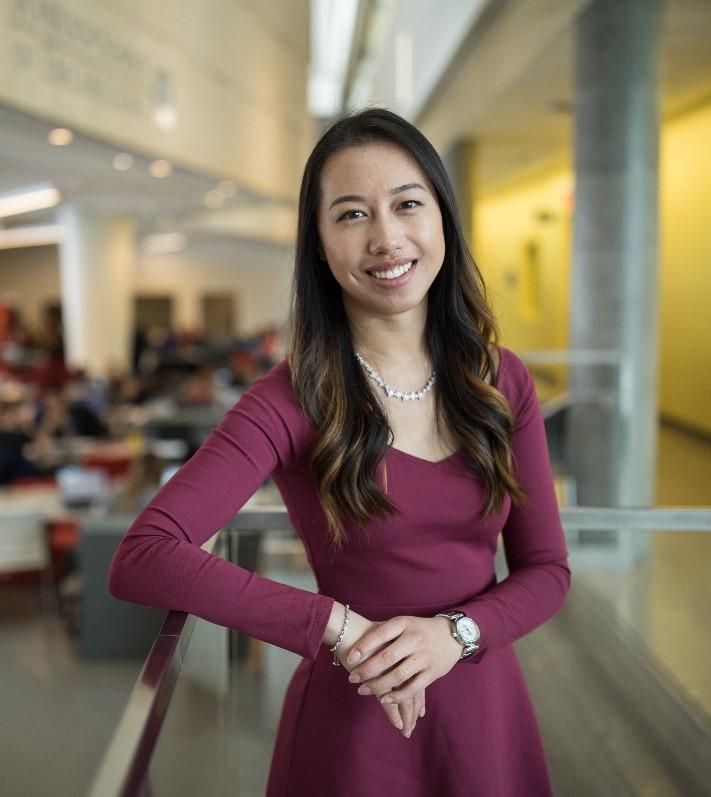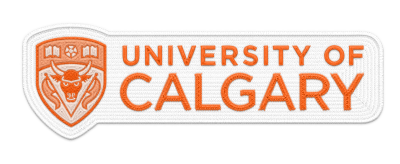Recent graduate
Jiani Deng, BSc (Eng)'19

Where is she today?
Facilities Field Engineer for TC Energy
Former ESS President works on furthering the Keystone XL project
Jiani Deng graduated from chemical engineering with a specialization in energy and environment. She was a 2014 Schulich Scholar, 2018-2019 Engineering Students’ Society President, and recipient of the 2019 APEGA Ivan Finlay Leadership Award. She started her career as a field engineer with Schlumberger in pressure pumping services. She began training in Oklahoma, before making her way to Grande Prairie, Alberta, where she gained hands-on experience operating equipment and supervising. She is currently a facilities field engineer for TC Energy’s Keystone XL Project. She enjoys working with many stakeholders, contractors and internal groups to see a project built from the ground up. Outside of work, she enjoys hiking, snowboarding and spending her weekends in the winter as a ski instructor for kids with cognitive disabilities.
I believe at the core of engineering is problem solving. As an engineer, I work through diverse problems and come up with unique solutions.
Jiani Deng
BSc (Eng)'19
Why did you want to become an engineer?
The reason I wanted to be an engineer has evolved since I first applied to engineering to now. In high school, I was passionate about sustainable energy, and I wanted to design wind turbines, research nuclear fusion and advance photo-voltaic technology. I have realized since then that engineering is not just about research and design. In fact, I realized I am not interested in the technical aspects of engineering. What I found engineering has taught me is how to problem-solve, and that is what I enjoy most about it. Being a field engineer, I face issues every day, and some need an answer within the minute. I really enjoy working with diverse groups of people to solve these problems. I also have the opportunity to contribute to decisions that impact environmental sustainability, about which I am still very passionate.
What Schulich experience best prepared you for your career today?
The courses that I took during my degree gave me a good foundation and prepared me for my career. Many people say you only use 10 per cent of what you learn in school at work, and I think that is completely true. For me, the rest of the 90 per cent was gained outside of the classroom. I learned how to come up with and present a business case when I competed in Haskayne Consulting Club case competitions, communicated with stakeholders when I was Sponsorship Director for the Petroleum and Energy Society, and dealt with conflict when I was a Resident Advisor. All of these experiences have shaped me and taught me valuable skills that I now use in my career.
Can you describe an accomplishment from your time at UCalgary that makes you feel proud?
Public speaking was something I actively avoided as a student. I would always make scripted presentations and make sure I had the shortest part. In my final year of university, my friend and I decided to compete in the Schulich Engineering Competition in the category of Re-Engineering because there wasn’t anyone else competing in that category, which meant we automatically qualified for the Western Engineering Competition.
The day of the competition, we find out three other groups had also signed up for the same category. The competition involved coming up with an innovative solution to one of two topics, writing a brief report on our proposed solution, and creating a 30-minute PowerPoint presentation; all within four hours. My partner and I didn’t even have time to run through the presentation before we presented it to the judges.
We ended up placing first at the competition, placing second at the Western Engineering Competition and going on to the Canadian Engineering Competition. Going from someone who was afraid of public speaking to having to present without rehearsing at a national level was very intimidating, but I am proud I took on the challenge.
What advice do you have for new engineering students?
These three, four, five or six years of your life will feel like they are over in the blink of an eye, so enjoy them. Take advantage of everything the university has to offer. Go on as many conferences, study abroad trips and other travel opportunities as you can; join clubs; take part in teams; and sign up for competitions. Make new friends. Don’t be afraid to step out of your comfort zone. And, learn as much as you can.
It’s no secret that engineering can be tough. Don’t be afraid to ask for help and support; it’s not a journey you have to make alone. Take the time to celebrate victories, whether big or small.
What does it mean to you to be an engineer?
This is a question I am still trying to figure out myself! I have had three different roles as an engineer in training, and each have been so different and have shaped what it means to me to be an engineer. I think that is the amazing part of many engineer in training programs; we get to experience new roles, build different skill sets and make our own definitions of what being an engineer is. I believe at the core of engineering is problem solving. As an engineer, I work through diverse problems and come up with unique solutions. No matter the role, location or type of project, we – as engineers – have a mandate to make decisions that impact and contribute to society.
